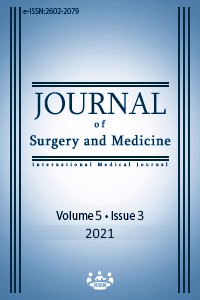Evaluation of nitric oxide metabolism and malondialdehyde levels as an indicator of oxidant stress in malign and parapneumonic pleural effusion
Keywords:
malondialdehyde, Arginase, nitric oxide, nitric oxide synthase, pleural effusionAbstract
Background/Aim: Pleural effusion is an important pathology which usually develops comorbid to varying diseases and negatively affects the quality of life. Studies to understand the etiopathogenesis of the disease are important. Although there are some studies in the literature about the arginine-NO metabolism in pleural diseases, there is not another study including all patient groups and the parameters examined in this study. Pleural fluid arginase and NOS (nitric oxide synthase) activities as well as NO (nitric oxide) and MDA (malondialdehyde) levels of patients were determined. The aim of our study was to investigate the possible relationship between these parameters and the mechanism of pleural fluid accumulation. Methods: In this study, pleural fluid arginase and NOS (nitric oxide synthase) activities as well as NO (nitric oxide) and MDA (malondialdehyde) levels of patients with malignancy, pneumonia and CHF (congestive heart failure) were determined. Our study was a cross-sectional descriptive research and our study groups consisted of patients with pneumonia (n=28), malignancy (n=28) and CHF (n=24). NO and MDA level with arginase and NOS activity were determined spectrophotometrically. Results were expressed as mean (standard deviation). Results: Pleural fluid arginase activity in CHF patients was significantly lower than in the malignancy and pneumonia groups (P=0.003). The pleural NO level and NOS activity were higher in the malignancy group than in the other groups (P<0.001). Compared to the other groups, MDA level was significantly increased in the pneumonia group. (P<0.001). Conclusion: In the light of these results, it may be concluded that the arginase- NO metabolism and MDA formation are involved in the pathogenesis of pleural effusions.
Downloads
References
Elgün S, Kaçmaz B, Durak I. A potential role for nitric oxide pathway in tuberculous pleural effusion. Int J Tuberc Lung Dis 2005;9(3):339-43.
Ambe K, Watanabe H, Takahashi S, Nakagawa T, Sasaki J. Production and physiological role of NO in the oral cavity. Jpn Dent Sci Rev. 2016;52(1):14-21.
Förstermann U, Sessa W. C. Nitric oxide synthases: regulation and function. Eur Heart J 2012; 33: 829–837.
M. Antosova, D. Mokra, L. Pepucha, T. Buday, M. Sterusky, A. Bencova. Physiology of nitric oxide in the respiratory system. Physiol. Res. 2017;66:159-72.
Hogg N, Kalyanaraman B. Nitric Oxide and lipid peroxidation. Biochim Biophys Acta. 1999;1411(2-3):378-84.
Light R.W. Pleural diseases. Dis Mon. 1992;38(5):266-331.
Chinard FP. Photometric estimation of proline and ornithine. J Biol Chem. 1952;199(1):91-5.
Durak İ, Kavutcu M, Kaçmaz M, et al. Effects of isoflurane on nitric oxide metabolism and oxidant status of rat myocardium. Acta anaesthesiol Scand. 2001;45(1):119-22.
Ignarro LJ, Buga GM, Wood KS, Bryns RE, Chaudhuri G. Endothelium-derived relaxing factor produced and released from artery and vein is nitric oxide. Proc Natl Acad Sci USA. 1987;84(24):9265-9.
Dahle LK, Hill EG, Holman RT. The thiobarbituric acid reaction and the autoxidations of polyunsaturated fatty acid methyl esters. Arch Biochem Biophys. 1962;98(2):253-61.
Bhatnagar R, Maskell N. The modern diagnosis and management of pleural effusions. BMJ. 2015;351:h4520.
Kroegel C, Antony VB. Immunobiology of pleural inflammation: potential implications for pathogenesis, diagnosis and therapy. Eur Respir J. 1997;10(10):2411-8.
Owens MW, Grisham MB. Nitric oxide synthesis by rat pleural mesothelial cells: induction by cytokines and lipopolysaccharide. Am. J. Physiol. 1993;265(2 Pt 1):L110-6.
Cuzzocrea S, Mazzon E, Calabro G, Dugo L, De Sarro A, van De LOO FA, et al. Inducible nitric oxide synthase-knockout mice exhibit resistance to pleurisy and lung injury caused by carrageenan. Am J Respir Crit Care Med. 2000;162(5):1859-66.
Regnault C, Roch-Arveiller M, Florentin I, Giroud JP, Postaire E, Delaforge M. Kinetic evaluation of nitric oxide production in pleural exudate after induction of two inflammatory reactions in the rat. Inflammation. 1996;20(6):613-22.
Schneider E, Dy M. The role of arginase in the immune response. Immunol today. 1985;6(4):136-40.
Chang CI, Liao JC, Kuo L. Arginase modulates nitric oxide production in activated macrophages. Am J Physiol. 1998;274(1 Pt 2):H342-8.
Hammouda Ae-R, Khalil MM, Salem S. Lipid peroxidation products in pleural fluid for separation of transudates and exudates. Clin Chem. 1995;41(9):1314-5.
Papageorgiou E, Kostikas K, Kiropoulos T, Karetsi E, Mpatavanis G, Gourgoulianis KI. Increased oxidative stress in exudative pleural effusions: a new marker for the differentiation between exudates and transudates? Chest. 2005;128(5):3291-7.
Mangaraj M, Kumari S, Nanda R, Pattnaik M R, Mohapatra P C. Pleural fluid MDA and serum-effusion albumin gradient in pleural effusion. Indian J Clin Biochem. 2008;23(1):81–4
Downloads
- 423 509
Published
Issue
Section
How to Cite
License
Copyright (c) 2021 Pınar Koyuncu, Adem Koyuncu, Serenay Elgün
This work is licensed under a Creative Commons Attribution-NonCommercial-NoDerivatives 4.0 International License.
















